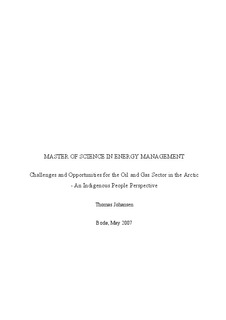Challenges and opportunities for the oil and gas sector in the Arctic - an indigenous people perspective
Master thesis
Permanent lenke
http://hdl.handle.net/11250/140889Utgivelsesdato
2007Metadata
Vis full innførselSamlinger
Sammendrag
This Master thesis examines the challenges and opportunities with indigenous people for an
oil and gas company in the Arctic. After the Second World War the exploitation of
hydrocarbons was intensified in most Arctic regions; especially in Russia. The new prospect
for the Barents Sea expressed in Norway’s High North Strategy (2006) could make this area
the most industrialized in the Arctic. But the Arctic is also a homeland for many different
indigenous people with over 40 different languages. And the native people say the North is
their homeland. They have lived there for thousands of years. They claim it is their land, and
they believe they have a right to say what its future ought to be. The investigation primarily
addresses the following research question: What are the challenges with indigenous people
for the oil and gas industry working in the Arctic? For the purpose of winning insight and
building a holistic picture of the complexities with these challenges, I have gathered data from
several different disciplines including international law, indigenous culture, society and
economy in the Arctic and biology. The major findings from the investigation are that
challenges with indigenous people are concerned about the protection of their tradition,
customs, distinct way of life and culture. The paper propose several opportunities that an oil
and gas company has in order to protect the distinct way of life and reduce adverse impacts
from operational discharges, tankers and pipelines.
Beskrivelse
Mastergradsoppgave i Energy management - Høgskolen i Bodø, 2007
